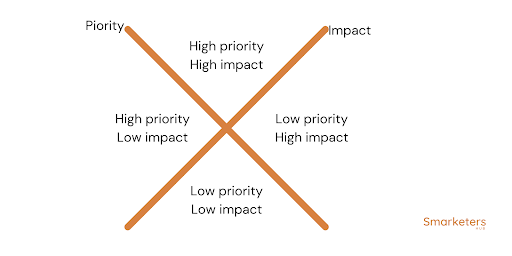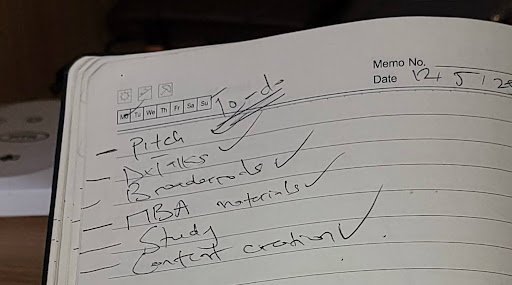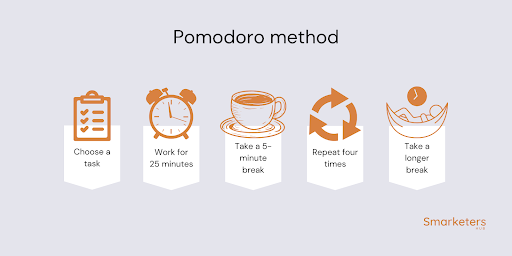7 time management strategies for freelancers in 2025
Staying focused can feel like a losing battle, especially when your “office” could be anywhere. One moment you're deeply engaged in work, and the next you're watching TikTok videos or catching up on random updates on X.
The distractions just keep coming.
At the same time, there are urgent client requests, nonstop emails, and tasks that never seem to get completed. It’s easy to feel like you're constantly busy but not actually making progress.
I’ve experienced that too.
Some days, I’d spend ten hours working and still end the day feeling drained and frustrated, wondering where all the time had gone. It wasn’t because I wasn’t trying. It was because I lacked structure.
Once I learned how to manage my time more effectively, everything changed. I created systems that helped me take control of my schedule, maintain focus, and make steady, meaningful progress.
You can do the same.
In this article, I will share 7 time management strategies to help you turn your workdays around.
Table of content
2. Why is time management important for freelancers?
3. 7 time management strategies for freelancers in 2025
Let’s start by understanding what “time management” is in the eyes of someone who works remotely.
What is time management?
Time management means using your day wisely. It's not about doing more. It's about doing what matters most.
I thought about this a lot when I was working with Usman Akram, who was the Head of SEO at Flying Cat Marketing at the time. I often wondered how he managed his full-time role, consulting projects, and personal life all at once.
He was always active on Slack, no matter the hour.
With teams spread across nine different time zones, he still managed to respond quickly and stay involved.
That kind of reliability stood out to me, and I kept wondering, “How was he able to handle it all so well?”
Usman has always struck me as someone who truly understands time management. That’s why I asked him to share his point of view on it.
Here’s what he said:
“To me, time management is not about filling every minute with productivity hacks. It’s about structuring your day in a way that matches how you naturally work. That means understanding when you are most focused, prioritizing meaningful tasks over busywork, and using tools like time-blocking to protect your focus.
It’s not about waking up at a specific time, like 5 a.m. It’s about matching your schedule to your energy levels. If mornings are not your strength, waking up early might actually hold you back.
I also believe it’s possible to overdo it. Sometimes, good time management just means showing up, doing the work, and moving on. Not every day has to be highly productive. Some days just need to be steady and consistent.”
He doesn’t believe in fixed wake-up times or hilarious routines like Ashton Hall’s, which start at 3:52 a.m. with mouth taping, a face dunk in ice-cold Saratoga spring water multiple times a day, and rubbing banana peels on his face.
He believes your schedule should support how you work best.
And… that stuck with me.
What’s the bottom line?
You don’t need a perfect routine. You just need one that fits how you really work.
Why is time management important for freelancers?
Time management helps freelancers stay organized across all types of workloads. It’s about using time wisely and staying focused on what matters, and not just about meeting deadlines.
As a freelancer, you set your schedule. While that can be freeing, it’s also stressful.
Without structure, it’s easy to either do too little or take on too much.
Some days feel limitless. Others feel scattered. And… the pressure to respond to clients quickly, take every call, and keep up with tasks can build up fast.
That’s why strong time management matters.
It helps you:
Set clear boundaries between work and personal time
Focus on deep work instead of multitasking
Take breaks without feeling guilty
Deliver better results for clients
Avoid burnout
It’s about making each hour count. So… here are the time management strategies to help you turn your workdays around.
💡 Don’t miss: How to pitch international clients as a freelancer
7 time management strategies for freelancers in 2025
There’s no way around it: staying on top of your time as a freelancer is tough. But it can help you get more done, stress less, and keep your clients happy.
1. Prioritize your tasks
Prioritization helps you focus on what matters most.
A framework that ranks tasks based on priority and impact
It keeps you from wasting time on low-impact tasks and gives you a clear path forward when everything feels urgent. Even with a long to-do list, knowing what to tackle first helps you stay calm and actually get things done.
Good prioritization makes your day more productive in several ways:
Helps you avoid decision fatigue
Keeps your goals front and center
Gives you momentum by starting with what matters
Builds confidence by showing daily progress
A great example of prioritization in action comes from John Iwuozor, a freelance B2B SaaS writer.
“When you get a new task, act on it right away. I’ve noticed that once I receive a brief, my mind begins thinking about how to approach it. That’s the perfect time to take some kind of action, even if it’s just doing a bit of research. Having a few things in place early makes it easier to finish ahead of time and take on more work. It’s a much better approach than waiting and then rushing to meet the deadline.”
John suggests that acting on a task while it’s still fresh in your mind helps you start early, avoid last-minute stress, and manage your time more effectively. His point is not just about working quickly but about using the right timing to build momentum and stay ahead.
Here’s how to build better prioritization into your day:
Use methods like the Eisenhower Matrix or time blocking
Ask yourself, “What moves the needle?”
Group similar tasks and batch them
Set deadlines even for small things
Reviewing goals weekly and adjusting as needed
As James Clear, author of Atomic Habits, says, “You do not rise to the level of your goals. You fall to the level of your systems.”
Prioritization isn’t about doing everything. It’s about doing the right things at the right time.
2. Delegate to others
Delegating tasks the right way (and to the right people) is important for your freelance career. It shows trust and frees up your time to focus on high-value work.
I’ve seen the benefits myself while managing different projects.
When you delegate with intention and clarity, it becomes a real growth tool. I don’t just hand off tasks; I choose who to delegate to based on:
Their strengths and skill set
Experience with similar work
Their current availability
How clearly I can explain the task
Here are a few steps I follow to delegate tasks:
Be clear about the outcome you expect
Share enough context to guide the work
Trust the person to deliver
Stay available for support, but don’t take over
Give useful feedback when the task is done
You don’t need to do everything yourself to succeed. Delegating well has helped me manage more work, reduce stress, and improve my personal life.
3. Establish deadlines
Deadlines help you stay focused and finish tasks on time. But the most important thing is to set realistic deadlines that match your natural working rhythm.
Some people, like me, are more productive in the morning. Someone like Usman works better later in the day. Forcing yourself into the wrong schedule can slow you down and lead to unfinished work.
Usman explains it well:
“I’m not a morning person, so I stopped pretending I could do deep work at 9 a.m. My focus hits its stride in the evening, so I usually block 2 p.m. to 6 p.m., or even later, for strategy, writing, or any work that needs deep thinking. Mornings are better for admin tasks and emails.”
To set better deadlines:
Pay attention to when you feel most focused
Break big projects into smaller steps with clear time limits
Use tools like calendars and reminders to stay on track
Give yourself space between tasks
Adjust when needed, but stay consistent
Good deadlines create structure and help you move forward with less stress.
4. Avoid multitasking
Multitasking may seem like a skill, but it often leads to mistakes and lower-quality work. Focusing on one task at a time is a more effective approach and helps you achieve better results in less time.
I used to believe multitasking made me more efficient, but I quickly realized it only slowed me down and made my work less effective.
Since I stopped multitasking, I’ve seen several improvements:
Tasks are completed faster and with better quality
I feel less overwhelmed and more in control
I can focus deeply on one task without distractions
How to avoid multitasking:
Prioritize tasks and tackle them one at a time
Set specific time blocks for each task
Remove distractions by turning off notifications and closing unnecessary tabs
Take short breaks to stay refreshed
Avoiding multitasking has helped me work more efficiently and produce higher-quality results.
5. Set realistic goals
Staying productive starts with setting the right goals. That’s why I focus on outcomes, not endless to-do lists.
This simple habit helps me make steady progress without feeling overwhelmed:
Weekly goals keep me focused on what matters
I avoid wasting time on low-impact tasks
I stay clear and motivated throughout the week
For example, Usman doesn’t begin his day with a list of tasks.
Each Sunday evening, he asks himself, “What 3 things, if done this week, would make it a win?”
This helps him focus on results instead of getting lost in busywork. You can follow a similar approach by:
Setting clear, realistic weekly goals
Choosing no more than three important outcomes
Checking progress mid-week
Taking time to recognize what I’ve completed
Realistic goals can help you stay focused, work smarter, and feel good about your progress.
6. Create a to-do list
A simple to-do list can shape how your day turns out. Without a plan, it's easy to lose focus or waste time. But writing down your tasks gives your day structure and purpose.
Ibrahim Kazeem, a freelance writer, shared a habit that improved his work.
“One simple management tip that has truly worked for me over time is planning my day the night before. Before I go to bed, I write down the top 3-5 tasks I must complete the next day. This small change in habit gives me direction and keeps me focused.”
A freelancer’s handwritten to-do list
In his early freelance days, he often spent time just deciding what to do. Once he started planning ahead, everything improved. He used his time better, felt less stressed, and met more deadlines.
He uses simple tools to stay organized:
A notebook
A calendar
His Samsung notepad
These keep him on track without adding complexity. Here’s what works for him:
He plans his tasks the night before
He focuses on 3 to 5 important items
He uses tools that are easy and reliable
He checks off tasks to stay motivated
To-do lists help him stay clear, focused, and productive.
💡 Download the exact to-do list template I personally use to plan my day and stay focused. Use it daily to organize your top priorities and get more done.
7. Apply the Pomodoro method
Let’s be real.
It’s hard to stay focused for long hours. The Pomodoro method helps by breaking work into short, timed sessions with regular breaks.
This makes it easier to stay productive without feeling tired or distracted.
Here’s how it works:
Choose a task
Work for 25 minutes
Take a 5-minute break
Repeat four times
Then take a longer break (15 to 30 minutes)
I started using this method when I realized I was getting distracted too often. It helped me focus, stay on task, and avoid burnout.
Here’s what changed for me:
I used my time more wisely
I stopped jumping between tasks
I felt more energized during the day
To get the most out of it:
Set a timer for each session
Focus on one task at a time
Take short breaks to reset
Turn off all distractions
This method would help you work better, stay sharp, and finish more in less time.
Take control of your time
You now have a clear way to stay focused and organized each day. But planning is just one part of showing up strong in life. Without it, even smart and talented people fall behind or miss chances.
Here’s why:
Most people don’t manage their time well
They show up late or unprepared
They forget what they said they would do
They rush through the day without a plan
The smarter approach? Master planning so you can stay ready, earn trust, and get ahead.
So… download the exact to-do list template that I personally use if you haven’t already.
Love the practical time management strategies in this article? Visit our blog for more career advice, or join our community if you’d like to participate in exciting discussions about career and marketing.



